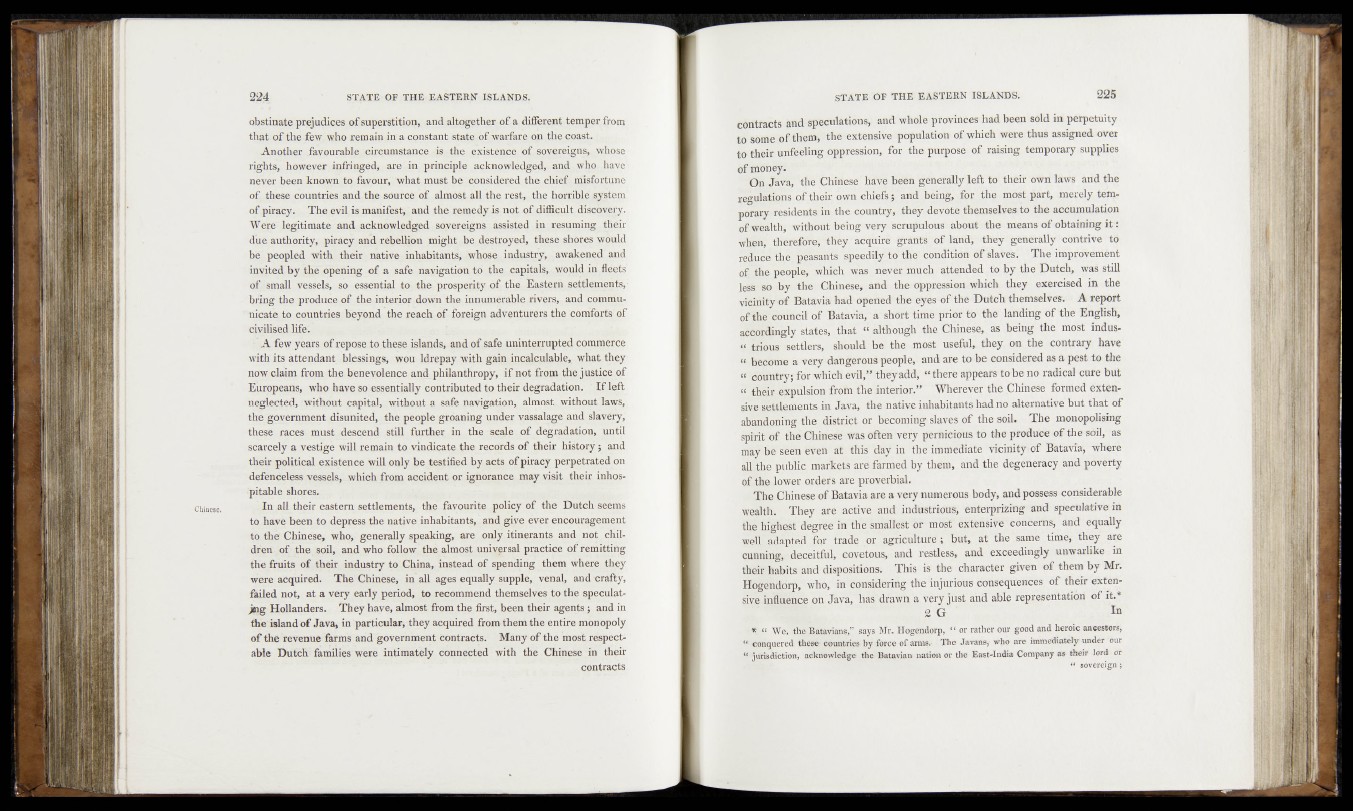
Cbiiiese.
obstinate prejudices of superstition, and altogether of a different temper from
that of the few who remain in a constant state of warfare on the coast.
Another favourable circumstance is the existence of. sovereigns, whose
rights, however infringed, are in principle acknowledged,. and who have
never been known to favour, what must be considered the chief misfortune
of these countries and the source of almost all the rest, the horrible .system
of piracy. The evil is manifest, and the remedy is not of difficult discovery.
Wejre legitimate and acknowledged soyereigns assisted in • resuming their
due authority, piracy and rebellion might be destroyed, these shores would
bë peopled with their native inhabitants, whose industry, awakened and
invited by tpe opening of a safe navigation to the capitals, would in^eets
of small vessels, so essential to the prosperity of the Eastern settlements,
bring the produce of the interior down the innumerable rivers, and communicate
to countries beyond the reach of foreign adventurers the comforts of
civilised life.
•’A few years of repose to these islands, and of. safe uninterrupted commerce
with its attendant blessings, wou ldrepay with gain incalculable, what they
now claim from the benevolence and philanthropy, if not from (ti£e justice of
Europeans, who have so essentially contributed to their degradation. ' I f left
neglected, without capital, without a safe navigation, almost, without laws,
the government disunited, the people groaning under vassalage and slavery,
these races must descend still further in the scale of degradation, until
scarcely a vestige will remain to vindicate the records of- their history j and
their political existence will only be testified by acts of piracy perpetrated on
defenceless vessels, which from accident or ignorance may visit their inhospitable
shores.
In all tijjgir eastern settlements, the favourite policy of the Dutch seems
to.haye been to depress the native inhabitants,, and give ever encouragement
to th e Chinese, who, generally speaking, are only itinerants and^not^cïlü-
drën .of the .sóil, and who follow the almost universal practice of remitting
thé fruits of. their industry to China, instead of spending them where.they
were acquired. The Chinese, in all ages equally supple, venal, and 'crafty,
failed not, at a very early period, to recommend themselves to the speculatin
g Hollanders, th e y have, almost from the first, been their agents j and in
the island of Java, in particular* they acquired from-them the entire monopoly
of the revenue farms and government contracts. Many of the most respectable
Dutch families were intimately connected with the Chinese in their
contracts
contracts and-spBcüktions, and whole provinces had been sold in perpetuity
to some o f therm the extensive ‘population of which were thus assigned over
to- their unfeeling oppression, for; the purpose of raising temporary supplies
of money.
On java,' the Chinese' hâve been génerally left to1 their own laws and the
regulations o^tijeyi qwn.chiefs^an'd being, for. ^the^mostpart, merely temporary'residents,
in the> country,) they devote themselves* to the accumulation
of wealth, without being very scrupulous about the means of obtaining it i
wlïfeil, theréfofë;: they acquire grants of land; ffley ^'enerally contrive to
reduce the, peasants speedily to the1 condition o f slaves. ' The improvement
of, the people, which was never much attended to by the Dutch, was still
less so by the Ghinese, and the oppression, which they exercised in the
viemitÿ-wf Batavia had opened the 'eyësr-ôf the Dutch themselves. A report
Of the council of Batavia, a shoft time prior to the landing of the English,
accordingly states, that “ -although the Glppesë, as being, tî^a moft indus-
« trious settlers, should he the most useful, they, on the contrary have
««. become a very dangerous people, and are to be considered as a pest to the
“ country; for which evil;” they add, "there appears to be no radical core hut
jj^JirLexpùlsion frofa the interior.” Wherever the Chinese formed extensive
settlements.in Java, the naflfe inhabitants had no alternative,jojife that of
abarppning tije district or becoming'slavey d f ïh e soiL The monopolising
spirit of the Chinese was often very pernicious to the produce of the soil, as
'ëVeh,J af this day in the immediate -tlciÛïifrbf Batavia, where
all tKp. public, markets’ a^C farmed by them, and téè Jdegene'râcj'Land poverty
of.the,lower orders are proverbial.
The Chinese of Batavia are a very numerous body, and possess considerable
wealth*. -'They are active and industrious, enterprising and speculative in
the highest degrëeÿ^the smallest or mW# éxtfeâsifb' côflcetfis', and equally
well adapted for trade ox^agrlcuTtufe \ ^ u ^ a fe '^ e ^ am e , time, they are
cunning,-AeceitM, covetous, and restless, and exceedingly unwariike in
their habits and dispositions. This is the character given of them by Mr;
Hogendorp, who, in considering the, injurious canstequteHees o f their extensive
influence on Java, has'drawn a.ver^r jusjfc' and able representation ôf it.*
2 Cr ' . In
* “ We, the Batavians,” says MT.*Hogen,dorp, or rather our good and heroiq ancestors,
Mt^ftÿgered. thèse1 Oouatiries- bÿforceef ârtas.- The Javans, wfc»- w itawieÜàttSy under hit,t
u juHsdicttOB-, acfcnewledg-e- (jhe Batavian nation Or the East-Iadia Company as- their lor# Or
•J s o v e r e ig n ;